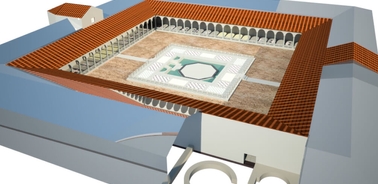- Home
- News And Events
- News
- Ie University To Recreate Late-era Roman Villa From Spanish Town Using Immersive Technologies
IE University to recreate late-era Roman villa from Spanish town using immersive technologies

The initiative is part of a sustainable economic development project in Coca (Segovia), the birthplace of fourth-century CE Emperor Theodosius I.
IE University is leading a project to promote tourism as a sustainable economic engine in the central Spanish town of Coca, the birthplace of Roman emperor Theodosius the Great (347-395 AD). CavcAR: heritage, new technologies and economic development, will see the reconstruction in the metaverse of a villa from the Theodosian period that the Archaeology Unit of IE University has been excavating for the last 24 years.
Work at Las Pizarras, near present-day Coca, is an extraordinary example of research innovation using new technologies to complement the ongoing excavation and archaeological research. This will give a precise idea of the royal villa, unique in Hispania, from the time of Emperor Theodosius, the last emperor to rule both the Eastern and Western Roman Empire, and a key figure in establishing Christianity in Europe.
The project will also see the creation of a Historical Interpretation Center of the Villa and Coca, a cultural space focused on promoting creative learning and understanding of the historical legacy of the town through immersive technologies such as virtual reality, augmented reality, and the metaverse. The center's business plan has been developed by IE University, with objectives aligned with the regional government of Castilla y León’s cultural heritage department.
IE University is combining its commitment to immersive technologies with a humanistic approach that makes it a pioneer in education and research. IE University, together with Elysium Ventures, created the Metaverse Center, the first research and innovation center on the metaverse. At the same time, the academic institution, through its Arts and Humanities Division, is working to enrich the learning experience and develop the critical thinking of its students by exploring the relationship between the humanities and technology.
"Historical heritage, in its relationship with the cultural landscape of a region, must be preserved, and also used to promote sustainable economic development."
Miguel Larrañaga, Vice Rector for Student Affairs and a Professor at IE University
"In turn, this must be based on business plans that, without trying to create theme parks, incorporate new technologies to generate experiences that are both exciting and educating for visitors," explains Miguel Larrañaga, Vice Rector for Student Affairs and a Professor at IE University.
A multidisciplinary network has been created within the university, bringing together professors and students from the areas of Business, Architecture, Design, Technology and Communication. In addition, an international consortium has been formed with the UK’s University of Leicester, the Archaeological Park of Pompeii, Peru’s Pontifical Catholic University, the US Escala Initiative, the University of Maastricht in the Netherlands, Portugal’s University of Coimbra, the Greek Ministry of Culture, and the Santa María la Real Foundation for Historical Heritage. Members of this group developed a series of workshops in April and May entitled 'Sustainable Economic Development and Cultural Heritage'. The same working methodology used in the Coca pilot project will be applied in different spaces around the world.